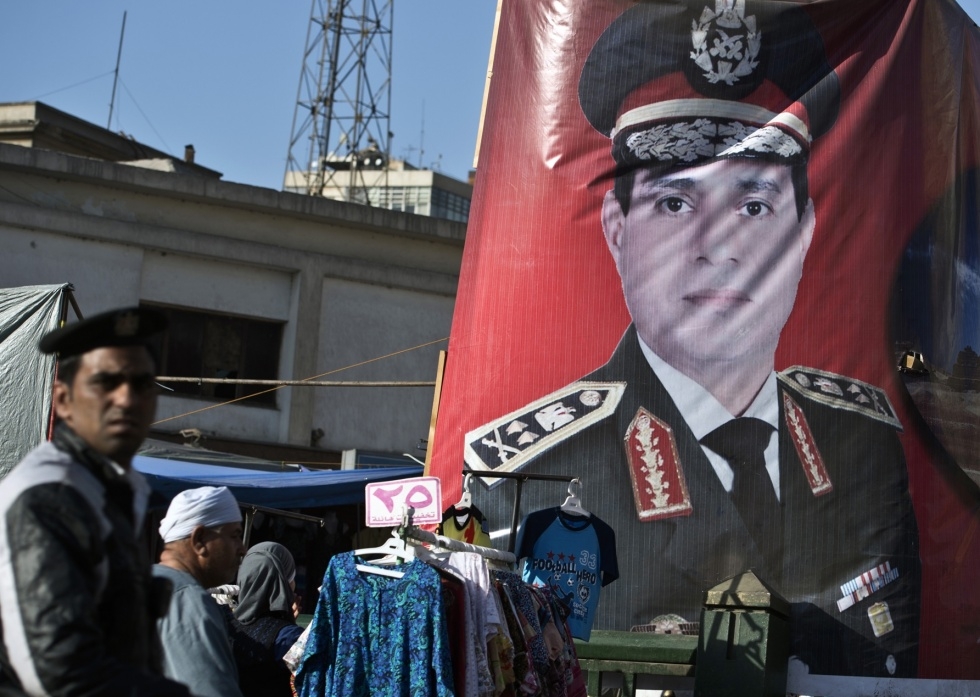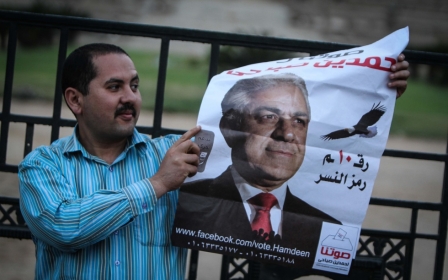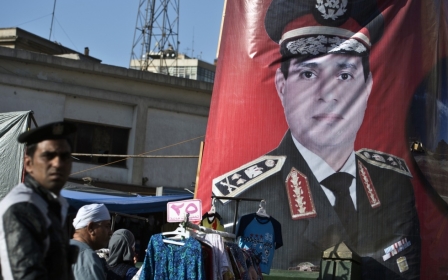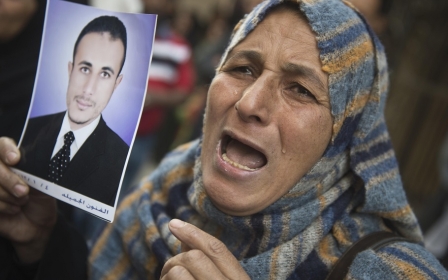Sisi plays executor for a domestic crowd

On 25 March, a court in Minya (some 250 kilometers south of Cairo) sentenced 529 members of the Muslim Brotherhood to death. The news then provoked some global outrage because of the clear miscarriage of justice that marred the process of conviction. Defense lawyers decried the haste with which the case was handled, claiming that they weren’t given enough time to respond to the evidence entered against their clients.
Many local and international human right organizations were furious as his sentence targeted an exceptionally high number of defendants in what was a relatively low-profile case - an attack on a police station that left one policeman dead. Unrepentant, the same court sentenced on April 28 yet another group of 683 to death.
This more recent sentencing brought some attention to the conduct of the government in Cairo, after a period of a low-profile coverage of the ongoing struggle over the fate of the country. The new sentence drew some reactions worldwide. Not all were strong or swift, aside from Turkey's, which has stood all along against the coup. The European Union has so far only spoke of a "plan" to condemn the mass sentence and the African Union expressed the "likelihood" that it would.
The US, which has just approved a significant military aid package to the ruling military in Egypt, described the court verdict as "unconscionable", but stopped short of suggesting a punishment.
The strongest reaction from a Western government came from the Swedish Foreign Minister, Carl Bidt, who - although confused over the number of the convicted in the recent case - stressed in a tweet that “The world must and will react.” Despite the mild nature of these reactions and the fact that they are unlikely to have practical consequences, such negative attention is hardly in the interests of the establishment in Cairo.
New MEE newsletter: Jerusalem Dispatch
Sign up to get the latest insights and analysis on Israel-Palestine, alongside Turkey Unpacked and other MEE newsletters
The Minya’s court verdicts, both the old and the new, are very unlikely to help the current regime’s bid to better its image locally or internationally. The presence of more than 700 persons on death row (waiting for the Mufti of Egypt to decide on whether they should or shouldn’t live) constitutes an ugly reminder of the past messy nine months in which unknown numbers of Egyptians (more likely in the thousands) lost their lives and much greater number now languish in deplorable conditions behind bars.
The interests of the current establishment (with all its components; the army, the court system and the police) lie in expunging from memory the images of carnage that Cairo seen last August. These images that paint a different picture from the narrative of replacing a repressive religious regime with a more liberal one. Any step that would refresh the minds of the local or international consumers of news of those images could clearly jeopardize those interests.
This begs the question of why would the prosecution pursue these harsh sentences when it appears that establishment’s interests are better served by a de-escalation of tension to deprive the opposition of any new grievance if this kind? More importantly, what will be the fate of those sentenced?
In attempt to address that question, it is important to remember a few pertinent facts about these cases. Firstly, a significant number of those sentenced aren’t yet in state custody and some appear to be outside the country. Second, some have already lost their lives in incidents during and after crackdowns on the two major sit-ins of Mohamed Morsi supporters in Cairo in autumn 2013. Thirdly, the recent court decisions included commuting the sentence of 492 (out of the 529 who were sentenced in March) from death to a life in prison. It only upheld its death verdict for the remaining 37. The same scenario is very likely to be repeated in the most recent case as well. Although not binding, the Mufti’s opinion might provide a venue for the government to seek to revise the sentence.
Finally, these sentences could be appealed before a higher court, and it is very unlikely - given that there were no precedent on this scale - that the government would go ahead with the execution.
What is the point then of these hasty trials and mass death sentences?
Both the nature and the scale of these sentences reflect the complex psychological environment in post-coup Egypt. When the military, represented by the minister of defense, Abd Al-Fattah al-Sisi, ousted Morsi, it declared the latter to be a traitor, a trait extended to his supporters.
Painting a portrait of Morsi as a traitor was necessary for Sisi (a man who until 1 July, 2013 had worked as a cabinet minister in Morsi’s government) to sketch his own portrait as a national hero. The media loyal to him passionately pursued that mission.
However, the aftermath of the putsch (the fluid situation on the streets, the persistence of the protests and the sit-ins organized by Morsi supporters) required pushing that binary of traitor-hero further to its extreme to justify the different size massacres that culminated in the mowing down of Rabi‘a sit-in. Sisi was not just any national hero. He was a God-sent savior, in the rank of Moses. Consequently, his enemies had to bear the worst libel of modern times: terrorism.
With the passage of time, the inability of the current regime to solve Egypt’s complex socio-economic problems, and with the Muslim Brotherhood persisting in their opposition to the coup mostly peacefully, one portrait (that of Sisi the savior) grew fainter. Although Sisi has given up on marketing the savor’s image abroad, and has instead opted to promote his future persona as a valuable semi-authoritarian ally in whatever global war currently in vogue, he still needs to maintain the glamour of that image, at least during the transitional period, in the eyes of his supporters home.
To keep a part of his savior’s portrait shining, Sisi has to match the vilification campaign proceeding in earnest on Egyptian media with some real steps on the ground. With the MB "definitely" guilty of heinous crimes (blowing up police stations, assassinating police officers, and conspiring with world Masons, the American regime, the Israelis, and Turkey to destabilize the country), the state must appear to use the full extent of the law to met out a swift and proper punishment on these elements.
The news of mass death and life sentences will have that effect. In the end, however, both life and death sentences may not need to be executed, especially not in the current mass scale, unless events took a course markedly different from the one currently anticipated by al-Sissi and his team.
Sisi doesn’t need nor could he preserve the savior’s image indefinitely. Once elected and many world governments - especially in the West - no longer feel a sense of public shame flaunting him as an ally, he could afford to lose much of the public support at home, without conceding too much to the Muslim Brothers and without endangering his rule. In the event of an increasing pressure from potential allies abroad, or once he became confident in his new status as the ruler of Egypt, Sisi will more likely reduce the sentences after the cases had generated sufficient noise so his government could look serious but merciful in the eyes of its supporters and the international community.
— Ahmed Meiloud is a PhD student at the School of Middle Eastern and North African Studies at the University of Arizona. His research interests include studying the various movements of political Islam across the Arab World, with special focus on the works of the thinkers, jurists and public intellectuals who shape the moderate strands of Islamism. He contributed this article to PalestineChronicle.com.
This views expressed in this article belong to the author and do not necessarily reflect the editorial policy of Middle East Eye.
Photo: Campaign posters for Abdel Fattah el-Sisi in Cairo (AFP)
Middle East Eye delivers independent and unrivalled coverage and analysis of the Middle East, North Africa and beyond. To learn more about republishing this content and the associated fees, please fill out this form. More about MEE can be found here.





